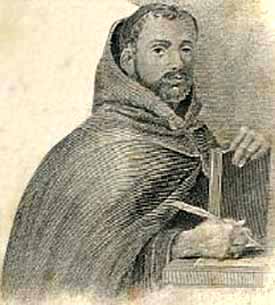 |
The Saint of the Day
St. John of the Cross – November 24
Prof. Plinio Corrêa de Oliveira
Biographical selection:

St. John of the Cross |
St. John of the Cross (1542-1591) was a confessor and doctor of the Church. He was co-reformer of the Carmelite Order with St. Teresa of Avila. He was a great mystic and left many famous maxims about the spiritual life. Some of them are the following:
* I did not know Thee, my Lord, because I still desired to know and relish trifling things. My spirit became dry because it forgot to rest in Thee.
* If you wish to attain holy recollection, you will do so not by approving but by denying.
* The devil fears a soul united to God as he does God Himself.
* The purest suffering produces the purest understanding.
* Through small things, one reaches the great. The evil that at the beginning appears insignificant, later becomes enormous and without remedy.
Comments of Prof. Plinio:
Let me comment one sentence at a time.
- I did not know Thee, my Lord, because I still desired to know and relish trifling things. My spirit became dry because it forgot to rest in Thee.
The love for trifles is one of the most deeply-rooted things that exist in the human soul. When one of us goes to a public square or a restaurant or when we take a bus where people are chatting, if we observe well, we will see that most of the time they are talking about trifling things. Also, when they are quiet they are usually thinking about trifling matters.
St. John of the Cross said: I didn’t know Thee, My Lord, because I wanted to relish trifles. What he means is that one who likes to taste trifles cannot taste the things of God. What is the reason for this? It is because the two are contrary things and no one is able to love opposite things at the same time. God is infinite, transcendent, and magnificent. A trifle is a very insignificant thing. The person who loves insignificant things cannot love the grandeur of God. So, we should ask Our Lady to free us from our attachments to trifles and prepare us to have true love for God.
The second part of the sentence – My spirit became dry because it forgot to rest in Thee – confirms the first. What kind of souls rest in God? They are persons who like to think about the situation of the Catholic Church, Catholic doctrine, the history of the Church and the supreme interests of God. These persons can say that they rest in God. Such men are sheep who graze and feed themselves on divine grass.
- If you wish to attain holy recollection, you will do so not by approving but by denying.
This is a magnificent sentence! It is based on a very anti-liberal principle. Optimistic and liberal souls who only want to see the positive side of everything do not have holy recollection, according to St. John of the Cross. On the contrary, those souls who vigilantly see the evil around them, discern it, and then deny it – these are the ones who attain true recollection. Therefore, the discernment of evil is the door that opens the way for holy recollection.
- The devil fears a soul united to God as he does God Himself.
It is beautiful! One sees in every day life the hatred of the Devil for the true Catholic, the true counter-revolutionary. It is a hatred that comes from fear. He trembles before a good Catholic as he trembles before God Himself, because he sees God in that person.
- The purest suffering produces the purest understanding.

To suffer well is to carry the cross in union with Christ
Above, the Holy Week procession in Seville |
It is a twofold affirmation. First, it says that each one of us should suffer purely, which is to accept our cross to the end, to honestly and gladly suffer what is asked of us without tricks and frauds.
Second, it states that whoever does this receives a greater capacity to understand the things of God, that is, to reach the highest and noblest part of reality. This understanding is not only the understanding of the intelligence but also of the sensibility of the soul. Therefore, accepting suffering makes the entire soul – the will, intelligence, and sensibility – more perfect and closer to God.
Through small things, one reaches the great. The evil that at the beginning appears insignificant, later becomes enormous and without remedy.
This is an eminently counter-revolutionary principle, eminently anti-liberal. One of the characteristics of the liberal mind is to imagine that everything will end well. Therefore, based on this principle, we should live life without concerns, optimistically. There would be no reason to intervene in affairs, because normally they go in the right direction and rarely finish badly. This liberal facet is also naturalistic. It does not take into account the supernatural and the preternatural, original sin and the chastisement God gave us for that sin. At depth, the man is optimistic because he does not believe in the consequences of original sin.
For this reason, the liberal becomes astonished when something goes wrong. "How could it happen?" he asks. "How could it be that this or that person did such a bad thing?"
The man who is anti-liberal thinks the opposite. He knows that without the help of supernatural grace, man has a strong tendency to evil, and that if he does not take special care, the evil will take root and grow in his soul. He realizes that if he makes a concession to some small vice, it can shortly reach the extreme of evil. Therefore, a bad glance, a bad thought, a first revolt, an initial laziness may lead to extreme consequences.
Let me exemplify this with laziness. Someone takes a lapse position in the face of an important matter regarding the Catholic cause that is being reported to him. Because he is lazy, he does not want to make an effort to think and react on the high plane the topic demands. He does this many times, and he acquires the habit of not responding to serious matters in the Catholic cause.

The Beheading of Louis XVI - Because the King did not rigorously oppose the revolution in the beginning he ended as a victim of it |
After a while, this habit of omission is transformed into indifference toward the great Catholic panoramas. He loses the appetite for the good, which is, according to St. Thomas, related to the death of the love of God. That is to say, something that began as a small concession, in a short time ended in the death of the love of God. For this reason, St. John of the Cross warns us to be vigilant and snuff out evil in its first spark; otherwise we will be facing a wide-ranging fire.
This principle also applies to History. Louis XVI did not take effective action to stop the beginning sparks of the French Revolution, and it ending by cutting off his head. Pope Leo X did not stop Protestantism in the beginning and it went on to sever one-third of Europe from the Church. We could make a sad and long list of catastrophes that should have been stopped in the beginning but were not, and became irreversible calamities.
These are a few of the maxims St. John of the Cross left for us to meditate on. We should ask Our Lady to help us make them firm principles for the good of our souls.


  | | Prof. Plinio Corrêa de Oliveira | |
The Saint of the Day features highlights from the lives of saints based on comments made by the late Prof. Plinio Corrêa de Oliveira. Following the example of St. John Bosco who used to make similar talks for the boys of his College, each evening it was Prof. Plinio’s custom to make a short commentary on the lives of the next day’s saint in a meeting for youth in order to encourage them in the practice of virtue and love for the Catholic Church. TIA thought that its readers could profit from these valuable commentaries.
The texts of both the biographical data and the comments come from personal notes taken by Atila S. Guimarães from 1964 to 1995. Given the fact that the source is a personal notebook, it is possible that at times the biographic notes transcribed here will not rigorously follow the original text read by Prof. Plinio. The commentaries have also been adapted and translated for TIA’s site.
|
Saint of the Day | Home | Books | CDs | Search | Contact Us | Donate

© 2002- Tradition in Action, Inc. All Rights Reserved
|
 |

|